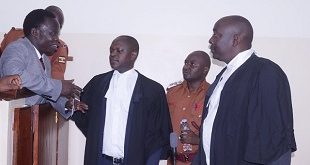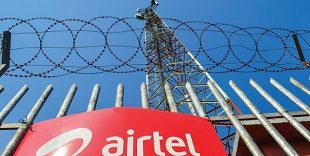
The Independent Team
On 28 March 1997 Australian air force jets intercepted a cargo plane in the airspace between northern Australia and Papua New Guinea. Sydney-based newspapers said the Antonov AN-124 aircraft that was grounded in Australia had been carrying several attack helicopters, military vehicles, and an arsenal of weapons, including heat-seeking missiles, grenades, 500 cases of ammunition, explosives and rockets.
The weapons were on their way to Papua New Guinea, for use by a foreign private military company'” Executive Outcomes'” hired to quell a secessionist rebellion on the Isle of Bougainville. This South African company was represented in Papua New Guinea by the British-based consultants Sandline International. However, the operation backfired after mutinous army units and protesting civilians opposed the use of mercenaries in the country, and the contract was suspended. The director of Sandline, former British colonel Tim Spicer, had to appear before a Commission of Inquiry in Papua New Guinea that probed the terms of the contract between the PNG government and Sandline.
From the Commission’s hearings, it is understood that the PNG government had been requesting attack helicopters and other lethal equipment from its usual channels in Britain, Australia and the USA. But the poor human-rights record of the PNG-armed forces meant that only’non-lethal’ and transport helicopters could be supplied. The PNG government then decided to sign a contract with Sandline International in January 1997. This contract, worth $36 million, comprised the supply of four helicopters, two Mi-17 armed transport helicopters and two Mi-24 helicopter gunships. It was reported that one of the companies in the chain of suppliers for the Eastern European-produced helicopters was the London-based Triton Sal. The brokering company was reportedly run by a Russian businessman.

According to the minutes of the hearings of the Commission of Inquiry, Spicer testified that the end-user certificates were signed on 27 January 1997. This was done by the chief of staff of the PNG armed forces and by the chief of logistics of the armed forces. These certificates covered the legal purchase of the helicopters and other equipment included in the contract. The documents were turned over to the Commission of Inquiry as evidence. Two of the certificates were addressed to Triton Sal.’It is a company with an office in London, one of the companies we use to procure military equipment’, replied Sandline’s director when questioned about the nature of Triton Sal. The end-user certificates referred to three of the four helicopters involved.’The way that we work is that we give Triton or another company the task of sourcing the helicopters. I believe these helicopters came in fact from Belarus’, said Spicer, according to the Commission’s transcripts.
Brigadier General Singirok of the PNG armed forces was suspended after he had organised the mutiny against the contract with Sandline International. He was also called as a witness before the Commission of Inquiry and confirmed Spicer’s evidence on the end-user certificates and the purchasing of the helicopters.
The suspended commander acknowledged that he had signed the certificates three days before the PNG government had authorized the contract with Sandline International. He explained that he had handed over five blank end-user certificates to Sandline. According to copies provided to the Commission, these were dated 1 February 1997. It seems, from the evidence of both Singirok and Spicer, that one of these blank end-user certificates from Papua New Guinea was eventually filled out by the Sandline representatives in London and addressed to its supplier company, Triton Sal. The latter company was reported to be selling or brokering the sale of former Soviet surplus equipment purchased in Belarus, apparently for sale at high prices to governments of developing countries.

In April 1997, coinciding with the sessions of the Commission of Inquiry in Papua New Guinea, the Ugandan government signed a purchasing arrangement for four similar helicopter gunships from Belarus.
The four helicopters were to be supplied by a UK-based company called Consolidated Sales Corporation (CSC), registered in the Virgin Islands.
However, when the initial batch of two helicopters arrived at Kampala airport, the’items delivered did not conform to the specifications of the contract’. A first official report by the deputy director of Military Intelligence of Uganda established that the helicopters had not been overhauled, as required in the contract between the Ugandan government and CSC.
Logbooks purporting to show the technical history of the second-hand helicopters were also questioned. According to British aviation authorities, the helicopters should have cost no more than $700,000 each, whereas the contract price of the helicopter gunships was $1.5 million per helicopter.
CSC rejected the report of the Ugandan official investigation, which led to the appointment of a second independent assessor. It was mutually agreed that the assessor be a helicopter company from South Africa, whose findings would bind both parties. After the independent assessor deemed the helicopters not airworthy, the Ugandan Defence Ministry released a press statement announcing that the agreement with CSC was terminated.
But Uganda had already paid half the price of the contract in the form of promissory notes that had been cashed by the selling company. Each of the four helicopters cost $1.5 million, but apparently the sum of $12 million had been agreed upon in an arrangement between the brokers of CSC and several highly placed Ugandan officials and businessmen. This would have been almost four times the price the gunships should have cost, given their condition, according to the aviation experts from South Africa and Britain. The purchasing price for the ineffective equipment raised a heated debate in Uganda’s Parliament, which requested greater transparency about the defence expenditure of the country.
On 11 February 1999 a motion to set up a select committee to probe allegations of corruption in the procurement of military equipment was rejected, although it was reported that several senior officers had already confessed to taking bribes in the deal. The Ugandan president then directed a new probe into the helicopter purchase agreement.
The report of the South African helicopter experts showed that the Ugandan government had used a middleman to purchase the helicopters because, at the time, it had no direct contract with the military authorities of the Commonwealth of Independent States or industries with a mandate to sell the helicopters.
According to the report, the proprietor of CSC was Emmanuel Katto. Chris Smith, a British public-relations consultant who referred to himself as director of CSC, was reported to have carried out the negotiations with the Ugandan Army. CSC had reportedly bought the helicopters from or via Triton Sal.
The helicopters had not been ordered for Uganda alone. After a Kampala-based newspaper had published a story on Rwandan complaints about the overpriced chopper deal, officials in the Rwandan capital reacted and acknowledged that two of the four contracted helicopters were for their country. As an official put it, it was difficult for Rwanda to acquire military items directly on the international arms market, so’the country had to turn to its friends in neighbouring countries’.
What really happened with the pricing and the delivery of the helicopters to Uganda and Rwanda remains unclear. Not only did the surplus deals involve equipment of questionable quality, but it seems that the big profits made by the various brokering agents and companies were split between businessmen and high officials in Uganda and London, at the expense of the Ugandan and Rwandan taxpayers. A Ugandan newspaper published a detailed report claiming that the Rwandan part of the deal involved a complex network of arms companies in Belarus, brokers in the UK and Uganda, a Russian arms dealer, an offshore company in the Virgin Islands, bank accounts in London and New York, and a money guarantee by a bank that no longer existed.
 The Independent Uganda: You get the Truth we Pay the Price
The Independent Uganda: You get the Truth we Pay the Price


